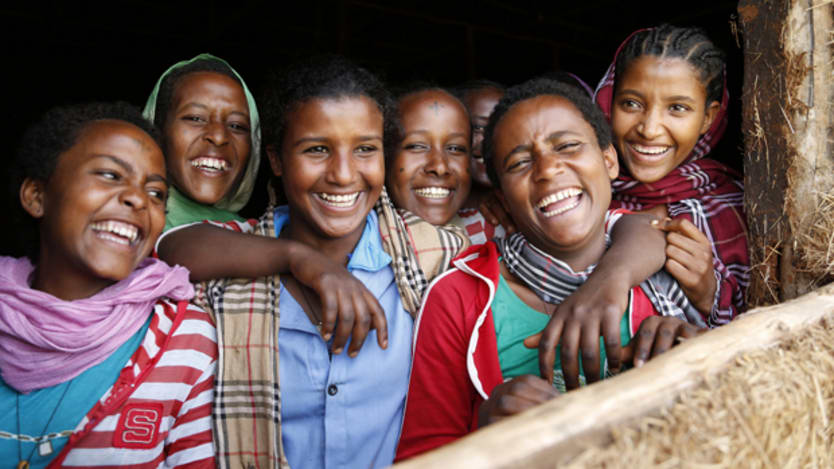
As the deadline for the Millennium Development Goals approaches, there can be no doubt that the MDGs, including MDG 3 — “promote gender equality and empower women” — have made a significant difference to the lives of women and girls worldwide.
As the 2013 MDG Progress Report released last month shows, disparities in primary school enrolment between boys and girls are being eliminated, and progress toward gender parity in school enrolment is evident at all levels of education. Women’s political participation continued to increase with 46 countries now having more than 30 percent female members of parliament. Women’s access to paid employment in non-agricultural sectors has been increasingly, albeit slowly. As the Organization for Economic Cooperation and Development has highlighted, the MDGs successfully galvanized greater investment in gender equality by donors. Bilateral aid targeting gender equality and women’s empowerment tripled from $8 billion in 2002 to $24 billion in 2012 — an annual growth rate of 12 percent.
However, so much more remains to be done, and time is running out.
Most urgently, while the maternal mortality rate dropped by 45 percent between 1990 and 2013, far too many women still die in pregnancy and childbirth — almost 300,000 women in 2013 alone — when these deaths are largely preventable. Girls from poor rural households are more likely to be out of school. Women continue to be concentrated in vulnerable employment, at higher rates than men, and women still take up just 21.8 percent of all parliamentary seats worldwide.
Further, some regions are lagging significantly when it comes to meeting the MDG gender targets. Girls still face significant barriers to entering both primary and secondary school in sub-Saharan Africa and Western Asia. Gender disparities only grow in secondary education. North Africa has one of the lowest proportions of women in paid employment, with little change over the past two decades. Very few women are represented in decision-making in some regions — in the Pacific women hold just 3 percent of parliamentary seats.
Maternal mortality rates remain much higher in sub-Saharan Africa, South Asia, the Pacific and the Caribbean. And globally, young women aged 15 to 24 have a 50 percent higher risk of becoming infected with HIV than their male peers.
The unfinished business of the MDGs must be addressed in the new post-2015 development agenda, now being negotiated by U.N. member states. At the same time, we can’t lose sight of the need to accelerate MDG implementation in the time we have left. It’s very welcome to see more than 50 countries already committed to accelerating the MDGs, with many of these countries focusing on MDG 5 on maternal mortality and MDG 3 on gender inequality. Further concerted effort and accelerated action by governments and the international community is urgently needed to achieve these lagging gender equality targets.
That said, and as recognized by U.N. member states during this year’s 58 session on the Commission on the Status of Women, some of the most critical gender equality challenges were missing from the MDGs. For example, violence against women, which affects one in three women worldwide, was not included. Nor was women’s disproportionate responsibility for unpaid care work — which constrains their ability to participate in social, political and economic life — or women’s unequal access to productive assets, including land, addressed in the MDG framework. What’s more, integration of gender equality targets and commitments was inadequate across the framework, impeding progress towards achieving all the MDGs.
The new post-2015 development agenda must squarely address these issues and the structural inequality and discrimination that underpin and reinforce gender inequality. That’s why it’s very welcome to see the recent report of the Open Working Group include not only a dedicated goal on gender equality and women’s empowerment, but also targets within the goal that go much further than MDG 3, by addressing key structural constraints to gender equality, including gender-based discrimination, violence against women and girls, harmful practices such as female genital mutilation and early, child and forced marriage, women’s disproportionate share of unpaid care work, lack of equal participation in decision-making in political economic and social life, and lack of sexual and reproductive health and rights. Important targets are also included in other goals, including reducing maternal mortality, equal rights to economic resources, eliminating gender disparities in education, full and productive and decent work for all women and men, and equal pay.
Commitment and action in these areas really has the potential to transform gender relations and the lives of women and girls everywhere.
Also welcome is the growing recognition — including among U.N. member states — that it’s simply not possible to achieve sustainable development unless gender equality and women’s empowerment are fully realized. Women’s education and women’s share of employment can have a positive impact on economic growth. When women have a greater voice, and participate in public decision-making, resources are more likely to be allocated to investments in human development priorities. And when women are better educated, children’s health and education outcomes improve. Achieving gender equality is critical to accelerate efforts to reduce poverty and promote human development.
There has been unprecedented engagement in the process of developing the new goals and targets, including in consultations around the world led by the U.N. system which have involved 3 million people to date. Expectations are high: people want the new development agenda to address insecurity, injustice, and inequality, including gender inequality.
Looking forward, as the deadline for the MDGs approaches — and negotiations on the new post-2015 development agenda gather pace — it will be critically important to keep the level of ambition high — indeed, to raise it even higher — as well as to rapidly accelerate implementation of existing gender equality commitments. Especially vital will be to ensure that the enabling environment required to achieve gender equality is in place — including supportive national laws and policies that are rights based and in line with international commitments, the right indicators and disaggregated and gender responsive data to measure progress, and most importantly, adequate funding for gender equality and women’s empowerment.
We have only 500 days left to both deliver on the MDGs and put in place a new transformative sustainable development agenda. We can’t put off to tomorrow what needs to be done today. Now is the time to deliver for women and girls.
Aug. 18, 2014, marks the 500-day milestone until the target date to achieve the Millennium Development Goals. Join Devex, in partnership with the United Nations Foundation, to raise awareness of the progress made through the MDGs and to rally to continue the momentum. Check out our Storify page and tweet us using #MDGmomentum.


